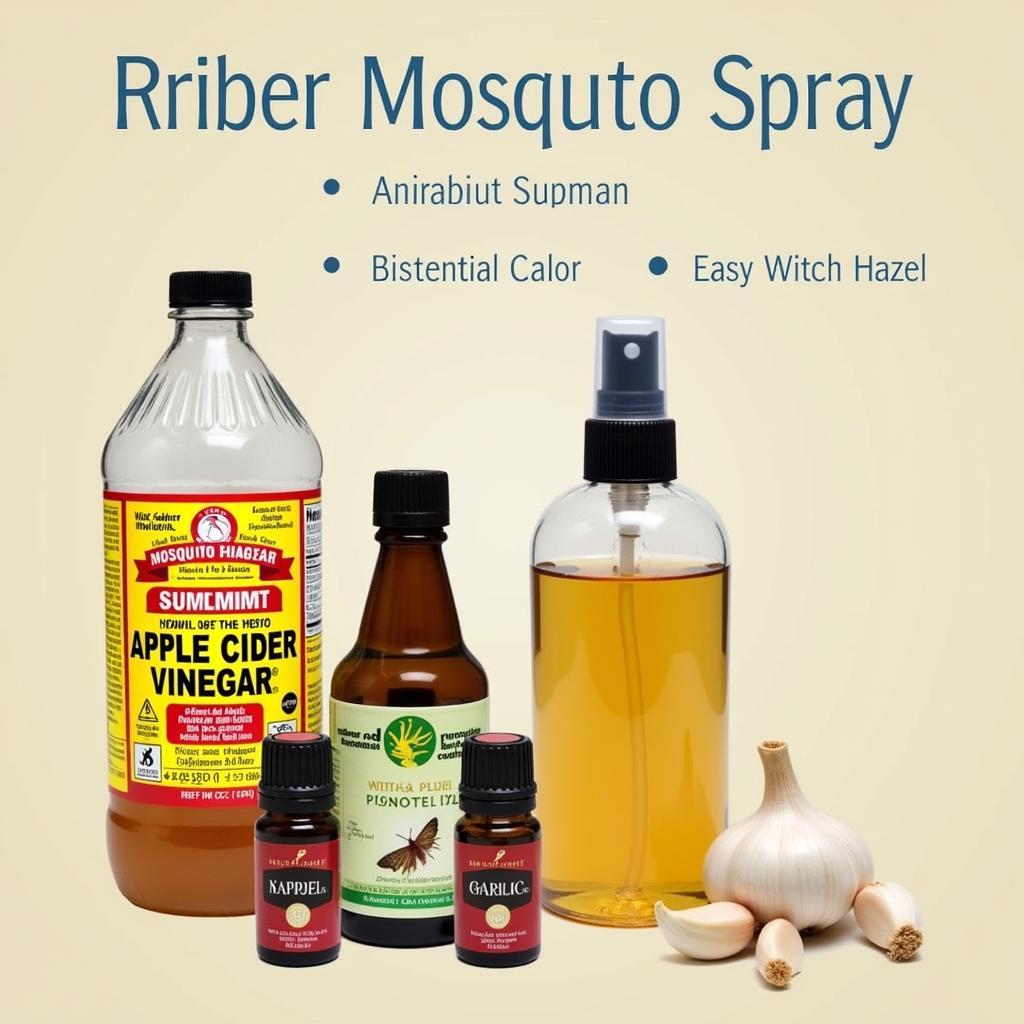Mosquitoes are a nuisance for everyone, including our equine companions. Protecting your horse from these pesky insects is crucial for their comfort and health. Homemade Mosquito Spray For Horses offers a natural, often more affordable, alternative to commercial products. Let’s delve into effective and safe DIY solutions for keeping your horse mosquito-free.
Protecting your horse from mosquito bites isn’t just about comfort; it’s about preventing diseases these insects can carry. West Nile Virus and Eastern Equine Encephalitis are just two examples of serious illnesses transmitted by mosquitoes. Using a homemade mosquito spray for horses can be a safe and effective way to minimize these risks. Learn how to create your own effective repellents with natural ingredients right here.
Why Choose Homemade Mosquito Spray for Horses?
Many commercial fly sprays contain harsh chemicals that can irritate a horse’s sensitive skin. A homemade mosquito spray allows you to control the ingredients, ensuring they’re safe and natural. Plus, making your own spray is often more economical. You likely already have many of the ingredients in your pantry!
You can find more information about fly control on our page about garlic for horses fly control.
Effective Recipes for Homemade Mosquito Spray for Horses
Here are a few tried-and-true recipes for homemade mosquito spray that you can easily whip up:
Apple Cider Vinegar Spray
- 1 cup apple cider vinegar
- 1 cup water
- 10 drops essential oil (e.g., citronella, lavender, tea tree)
Combine all ingredients in a spray bottle and shake well. Spray liberally on your horse, avoiding the eyes and nostrils.
Garlic and Witch Hazel Spray
- 2 cloves garlic, minced
- 1 cup witch hazel
- 1 cup water
Mix the minced garlic with witch hazel and water. Let it steep for a few hours, then strain the mixture into a spray bottle. This spray is known for its repellent properties.
 Homemade Mosquito Spray Ingredients
Homemade Mosquito Spray Ingredients
Essential Oil Blend
- 1 cup water
- 2 tablespoons carrier oil (e.g., coconut, almond)
- 30 drops combined essential oils (citronella, eucalyptus, tea tree, lavender)
Mix the essential oils with the carrier oil. Add the water and shake well. This blend offers a potent mosquito-repelling aroma.
Want to learn how to make a more general fly spray? Check out our guide on how to make fly spray for horses.
Tips for Applying Homemade Mosquito Spray
- Always test a small area of your horse’s skin first to check for any allergic reactions.
- Apply the spray liberally, focusing on areas where mosquitoes are most likely to bite, such as the legs, belly, and neck.
- Reapply the spray every few hours, especially during peak mosquito activity.
- Avoid spraying directly on the face, particularly around the eyes and nostrils.
- Store homemade sprays in a cool, dark place.
When to Consult a Veterinarian
While homemade mosquito sprays are generally safe, consult your veterinarian if your horse experiences any skin irritation or other adverse reactions. They can help determine the cause and recommend alternative solutions. Also, discuss any existing medical conditions your horse may have before using essential oils, as some can interact with certain medications.
“Always prioritize your horse’s health. If you notice any unusual reactions after using a homemade spray, consult your veterinarian immediately,” advises Dr. Emily Carter, DVM, specializing in equine health and wellness.
Looking for more natural repellent options? Visit our page on natural mosquito repellent for horses.
Conclusion
Homemade mosquito spray for horses provides a safe, effective, and affordable way to protect your equine companion from these biting pests. By using natural ingredients and following proper application techniques, you can help keep your horse comfortable and healthy during mosquito season. Remember to always test a small area first and consult your veterinarian if you have any concerns. Making your own mosquito repellent empowers you to prioritize your horse’s well-being while utilizing natural solutions.
“Regularly checking your horse for ticks and other parasites is also essential for their overall health,” adds Dr. Carter. “Prevention is always the best medicine.”
You can explore different types of sprays on our page dedicated to spray for horse flies.
FAQ
- How often should I apply homemade mosquito spray? Reapply every few hours, especially during peak mosquito activity.
- Can I use any essential oil in a homemade spray? While many essential oils are safe for horses, some can be toxic. Stick to known safe options like citronella, lavender, and tea tree oil.
- What should I do if my horse has a reaction to a homemade spray? Discontinue use immediately and consult your veterinarian.
- Are homemade sprays as effective as commercial products? While homemade sprays can be very effective, commercial products may offer longer-lasting protection.
- Can I use a homemade spray on other animals? Not necessarily. Recipes formulated for horses may not be safe for other animals.
- Is apple cider vinegar safe for horses? Yes, diluted apple cider vinegar is generally safe for horses and can act as a natural repellent.
- What are the signs of a mosquito bite allergy in horses? Signs can include hives, swelling, itching, and difficulty breathing.
For more options, check out our article on homemade bug repellent for horses.
Need further assistance? Contact us at Phone Number: 0772127271, Email: [email protected] or visit us at QGM2+WX2, Vị Trung, Vị Thuỷ, Hậu Giang, Việt Nam. Our customer service team is available 24/7.